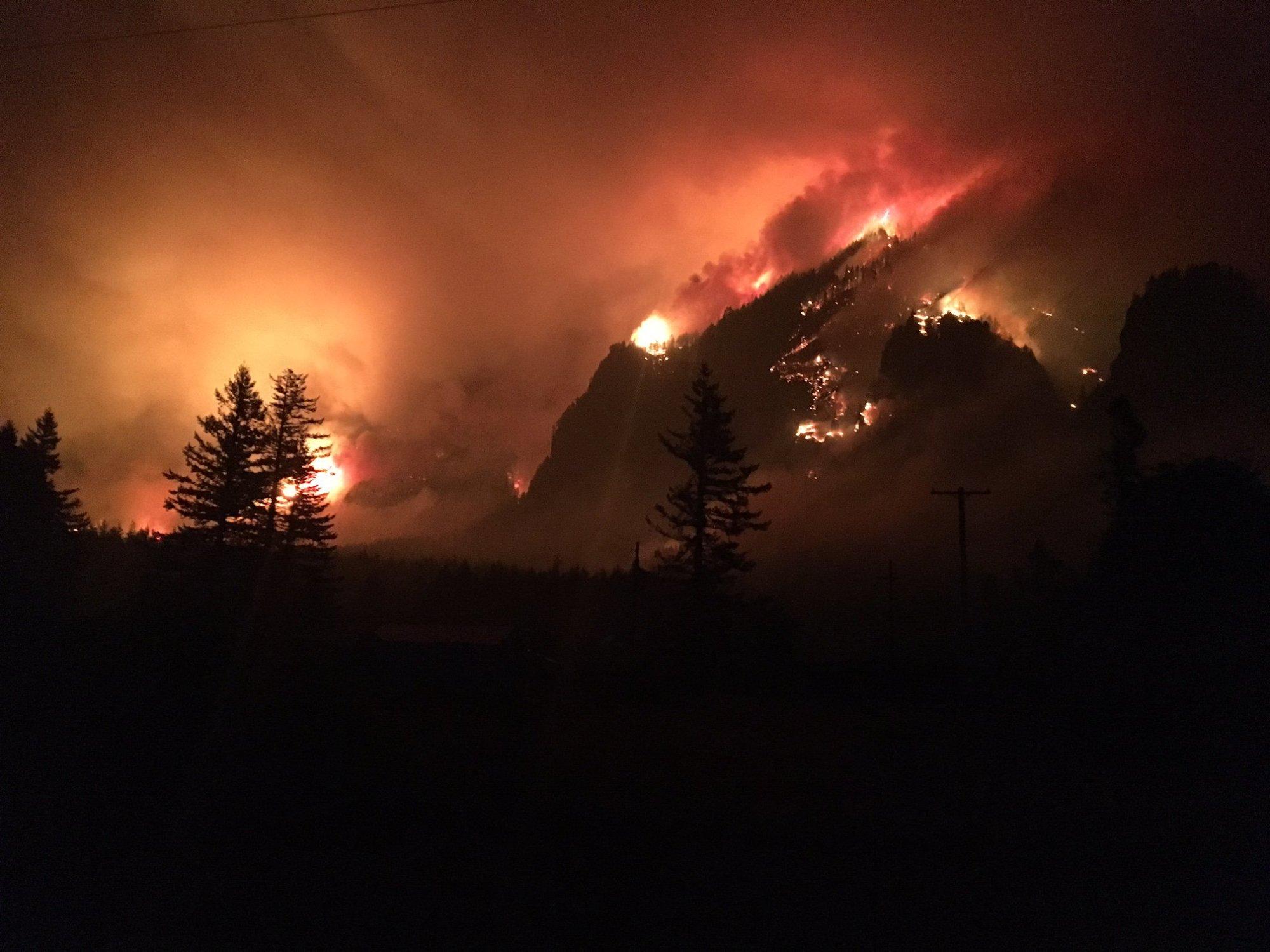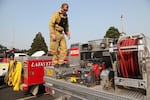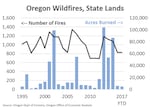
The Eagle Creek Fire spread through the Columbia River Gorge, September 4, 2017.
Courtesy of InciWeb
A total of 26 wildfires are burning in Oregon, 13 in Washington and 23 in Idaho.
Many are close to towns and are having a noticeable effect on their economies.
The Eagle Creek Fire is just a couple of hundred yards away from Cascade Locks, Oregon. It’s a small Columbia River Gorge town that brings in the bulk of its income during the summer months through tourism.
“I think it’s taken a huge hit because it’s been closed. Especially this happening over Labor Day weekend,” said Cathy Perez, a beer tender in Cascade Locks.
Her area of town is under a Level 2 evacuation order, meaning all her stuff is packed-up and sitting by her front door, ready to go.
Perez estimates 60 percent of the town’s money comes in during July, August and September — from hikers, bikers, windsurfers and sightseers. That's tens of thousands of dollars a day that's probably lost for the rest of this season.

Cascade Locks resident Cathy Perez, has all her stuff packed by her front door, ready to evacuate. She says the town is taking a financial hit as 60 percent of its income usually comes in during the summer.
Kristian Foden-Vencil / OPB
But she thinks the town has an ace up its sleeve — the Pacific Crest Trail.
“Cascade Locks is the only town that’s directly on the trail,” Perez said. “They have a drink, have a shower, stop at the post office to pick up their resupply packages. And that’s really fun because they’re international.”
While the fire is playing big locally, Perez thinks it hasn't become international news — so tourists will continue to come.
Her hopes are echoed around the Pacific Northwest, where more than 60 wildfires are burning hundreds of thousands of acres.
Some towns, like Brookings, Oregon, have seen thousands of people under evacuation orders. Not only are those towns missing tourist dollars, but some displaced locals aren't spending either.
The towns near those fires depend largely on tourism and timber, so people are worried. They’re concerned the forests and their vistas will be gone for good.
But that's not necessarily true.

Firefighters get ready to fight the Chetco Bar fire just a few miles outside of Brookings, Oregon.
Lt. Damon Simmons with the Oregon Fire Marshal's Office has driven through the gorge several times this week. He said the Eagle Creek Fire has been a mosaic burn, so the area is still beautiful.
“There are definitely areas that will look very different," he said. "But as I’m driving through, I saw ridge tops with a lot of trees and ridge tops where fire obviously went through and cleared them.”
Tom Cramblett, the mayor of Cascade Locks and captain of the Columbia Gorge Sternwheeler, a pleasure cruise ship on the river said he cuts the grass for the port.
Eventually, Cramblett said, there will be rain, the fire will go out and things will get back to normal — even with a blackened forest.

Cascade Locks Mayor Tom Cramblett says most residents aren’t getting a paycheck while the fire burns – that’s tens of thousands of dollars a day, not coming in.
Kristian Foden-Vencil / OPB
“The people who see it now, they’re going to miss that. It’s gone," he said. "But some kid growing up, who hasn’t seen it, when they see it in about a year or so, they’re going go: ’That’s beautiful.’”
You’d expect a mayor to look on the bright side. But how about other people?
Donna Bender runs a vacation rental business in Rowena, Oregon, 40 miles east along the Columbia. A bad wildfire ripped through her town just three years ago.
“During that time, I did have to call some people and say: ‘Hey, sorry I do have to cancel because guess what, nobody can get through, it’s closed. It’s all been evacuated,'” she said.
Bender estimated it took three weeks for the smoke to clear and the visitors to return. But in the longterm, there wasn’t much of an economic effect.
One of her biggest issues was hungry animals, looking for leafy greens.
“Before, I’d plant a pretty big vegetable garden. And you always know you’re going to lose some. But that year after — they like totally wiped everything out,” she said.
Josh Lehner with the Oregon Office of Economic Analysis said natural disasters can be an economic problem for a town. But they tend to be temporary and the region is usually economically whole within a year.

More than 500,000 acres have burned in Oregon this year, at a cost of over $200 million. Almost all of that is on private and federal lands. Wildfires and state lands have actually been low the past couple of years, following huge burns prior to that.
Oddly enough, he said, burned homes and lost cars show up as growth in gross domestic product figures as people rebuild. And because they rebuild with new products and technologies, the area can improve how it looks and how efficiently it runs.
Of course, that may be hard to see as folks in Cascade Locks, Oregon, Lake Chelan, Washington, and Chamberlain, Idaho, face evacuation orders and wildfires.
